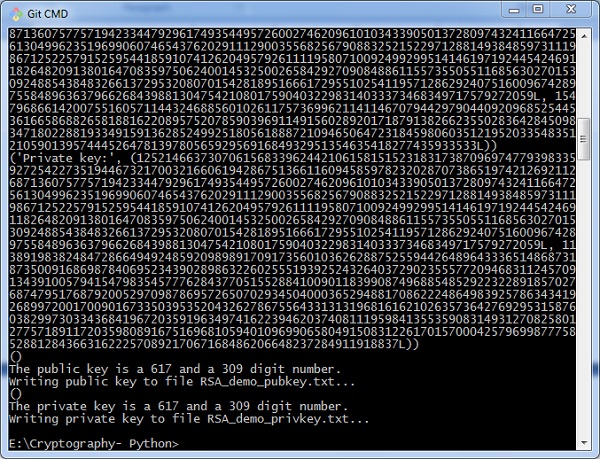RSA कुंजी बनाना
इस अध्याय में, हम पायथन का उपयोग करके आरएसए एल्गोरिथ्म के चरणवार कार्यान्वयन पर ध्यान केंद्रित करेंगे।
RSA कुंजी बनाना
RSA कुंजियाँ बनाने में निम्नलिखित चरण शामिल हैं -
क्रमशः दो बड़ी अभाज्य संख्याएँ बनाएँ p तथा q। इन नंबरों के उत्पाद को कहा जाएगाn, कहाँ पे n= p*q
एक यादृच्छिक संख्या उत्पन्न करें जो अपेक्षाकृत प्रमुख है (p-1) तथा (q-1). संख्या के रूप में कहा जाता है e।
ई के मॉड्यूलर व्युत्क्रम की गणना करें। गणना किए गए व्युत्क्रम को बुलाया जाएगाd।
RSA कुंजियाँ बनाने के लिए एल्गोरिदम
हमें पायथन का उपयोग करते हुए आरएसए कुंजियाँ बनाने के लिए दो प्राथमिक एल्गोरिदम की आवश्यकता है - Cryptomath module तथा Rabin Miller module।
क्रिप्टोमैथ मॉड्यूल
क्रिप्टोमैथ मॉड्यूल का स्रोत कोड जो आरएसए एल्गोरिदम के सभी बुनियादी कार्यान्वयन निम्नानुसार है -
def gcd(a, b):
while a != 0:
a, b = b % a, a
return b
def findModInverse(a, m):
if gcd(a, m) != 1:
return None
u1, u2, u3 = 1, 0, a
v1, v2, v3 = 0, 1, m
while v3 != 0:
q = u3 // v3
v1, v2, v3, u1, u2, u3 = (u1 - q * v1), (u2 - q * v2), (u3 - q * v3), v1, v2, v3
return u1 % mराबिनमिलर मॉड्यूल
RabinMiller मॉड्यूल का स्रोत कोड जो RSA एल्गोरिथ्म के सभी बुनियादी कार्यान्वयन निम्नानुसार है -
import random
def rabinMiller(num):
s = num - 1
t = 0
while s % 2 == 0:
s = s // 2
t += 1
for trials in range(5):
a = random.randrange(2, num - 1)
v = pow(a, s, num)
if v != 1:
i = 0
while v != (num - 1):
if i == t - 1:
return False
else:
i = i + 1
v = (v ** 2) % num
return True
def isPrime(num):
if (num 7< 2):
return False
lowPrimes = [2, 3, 5, 7, 11, 13, 17, 19, 23, 29, 31, 37, 41, 43, 47, 53, 59, 61,
67, 71, 73, 79, 83, 89, 97, 101, 103, 107, 109, 113, 127, 131, 137, 139, 149, 151,
157, 163, 167, 173, 179, 181, 191, 193, 197, 199, 211, 223, 227, 229, 233, 239, 241,
251, 257, 263, 269, 271, 277, 281, 283, 293, 307, 311, 313,317, 331, 337, 347, 349,
353, 359, 367, 373, 379, 383, 389, 397, 401, 409, 419, 421, 431, 433, 439, 443, 449,
457, 461, 463, 467, 479, 487, 491, 499, 503, 509, 521, 523, 541, 547, 557, 563, 569,
571, 577, 587, 593, 599, 601, 607, 613, 617, 619, 631, 641, 643, 647, 653, 659, 661,
673, 677, 683, 691, 701, 709, 719, 727, 733, 739, 743, 751, 757, 761, 769, 773, 787,
797, 809, 811, 821, 823, 827, 829, 839, 853, 857, 859, 863, 877, 881, 883, 887, 907,
911, 919, 929, 937, 941, 947, 953, 967, 971, 977, 983, 991, 997]
if num in lowPrimes:
return True
for prime in lowPrimes:
if (num % prime == 0):
return False
return rabinMiller(num)
def generateLargePrime(keysize = 1024):
while True:
num = random.randrange(2**(keysize-1), 2**(keysize))
if isPrime(num):
return numRSA कुंजियाँ बनाने का पूरा कोड इस प्रकार है -
import random, sys, os, rabinMiller, cryptomath
def main():
makeKeyFiles('RSA_demo', 1024)
def generateKey(keySize):
# Step 1: Create two prime numbers, p and q. Calculate n = p * q.
print('Generating p prime...')
p = rabinMiller.generateLargePrime(keySize)
print('Generating q prime...')
q = rabinMiller.generateLargePrime(keySize)
n = p * q
# Step 2: Create a number e that is relatively prime to (p-1)*(q-1).
print('Generating e that is relatively prime to (p-1)*(q-1)...')
while True:
e = random.randrange(2 ** (keySize - 1), 2 ** (keySize))
if cryptomath.gcd(e, (p - 1) * (q - 1)) == 1:
break
# Step 3: Calculate d, the mod inverse of e.
print('Calculating d that is mod inverse of e...')
d = cryptomath.findModInverse(e, (p - 1) * (q - 1))
publicKey = (n, e)
privateKey = (n, d)
print('Public key:', publicKey)
print('Private key:', privateKey)
return (publicKey, privateKey)
def makeKeyFiles(name, keySize):
# Creates two files 'x_pubkey.txt' and 'x_privkey.txt'
(where x is the value in name) with the the n,e and d,e integers written in them,
# delimited by a comma.
if os.path.exists('%s_pubkey.txt' % (name)) or os.path.exists('%s_privkey.txt' % (name)):
sys.exit('WARNING: The file %s_pubkey.txt or %s_privkey.txt already exists! Use a different name or delete these files and re-run this program.' % (name, name))
publicKey, privateKey = generateKey(keySize)
print()
print('The public key is a %s and a %s digit number.' % (len(str(publicKey[0])), len(str(publicKey[1]))))
print('Writing public key to file %s_pubkey.txt...' % (name))
fo = open('%s_pubkey.txt' % (name), 'w')
fo.write('%s,%s,%s' % (keySize, publicKey[0], publicKey[1]))
fo.close()
print()
print('The private key is a %s and a %s digit number.' % (len(str(publicKey[0])), len(str(publicKey[1]))))
print('Writing private key to file %s_privkey.txt...' % (name))
fo = open('%s_privkey.txt' % (name), 'w')
fo.write('%s,%s,%s' % (keySize, privateKey[0], privateKey[1]))
fo.close()
# If makeRsaKeys.py is run (instead of imported as a module) call
# the main() function.
if __name__ == '__main__':
main()उत्पादन
सार्वजनिक कुंजी और निजी कुंजियाँ संबंधित फ़ाइलों में उत्पन्न और सहेजी जाती हैं जैसा कि निम्नलिखित आउटपुट में दिखाया गया है।
